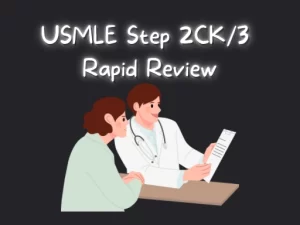In recent days, most medical students and graduates consider the USMLE Step 1 exam as the hardest and most stressful exam that they will ever take in med school. The reason to obtain a good USMLE score in this US medical licensing exam is must else it would essentially affect the clinical outcomes and residency to the forthcoming days. Incorporating tips to help you score high in the USMLE Exams, diligent preparation and strategic study methods become paramount for success in this challenging assessment.
An aspirant can take multiple USMLEs and other exams during their time as a medical student. However, USMLE Step 1 passing score is the only one that’s standardized and objectively evaluates the performance of the student scholastically.
Therefore, it is vital to get a good score on Step 1. Quality residency programs are very competitive for students who really want to become doctors. So, these programs play a major emphasis on USMLE Step 1 scores.
What’s the Step 1 Exam Like?
The USMLE Step 1 is a one-day exam which is divided into seven 60 minutes blocks which has to be taken in one 8-hour testing session. Usually, each block will not exceed 40 questions and the entire exam will not have more than 280 questions.
The med student has to take each block seriously because a good USMLE score is a must to succeed in the USMLE Step 1 exam.
Mastering the time management is also very important to take the Step 1 exam. The standard study tool should train the candidate not just to grasp the topics and obtain knowledge but also to get a good USMLE Step 1 score quickly and effectively.
When incorporating tips to help you score high in the USMLE Exams, it’s crucial to keep in mind that candidates must work really hard and practice rigorously within stipulated time frames. This approach ensures that they not only acquire a solid understanding of the content but also become better prepared for the challenges they will face on the exam day.
What Topics Does the USMLE Step 1 Exam Cover?
The USMLE Step 1 exam will cover the traditionally defined disciplines including the anatomy, behavioral sciences, biostatistics and epidemiology, biochemistry, microbiology, pharmacology, pathology and physiology. It also touches upon the interdisciplinary areas: aging, genetics, immunology, nutrition, molecular and cell biology.
The USMLE exam is conducted to ensure that the medical aspirant should obtain a good USMLE score by analyzing a candidate’s:
1. Basic sciences to the practice of medicine
2. Aptitude for studying effectively
3. Level of self-discipline
4. Ability and willingness to get the job done when it counts the most
5. Ability to absorb and retain technical information focusing on principles of health, disease and therapeutic interventions
Moreover, each question will be based on a clinical exam scenario where the candidate will be asked why and what are the reasons behind the symptoms, etc. Besides that, interpretation is made using diagnostic images, charts, graphs, pathogenic and normal specimens. Incorporating tips to help you score high in the USMLE Exams, med students should be well-prepared to navigate these challenges and secure a good USMLE score.
Tips to ace the USMLE exams
While you prepare for the eight-hour exam, it is very important to be proactive and review subjects long before the exam day in order to get a good USMLE score. These are the five USMLE Step 1 test tips that will help you be even more prepared and score high on the USMLE exams.
Be Aware that USMLE Step 1 is Not a Clinical Exam
The US medical licensing one -day exam tests your basic science knowledge and skills. It includes a handful of few clinical questions. But the majority of it is based on experiment interpreting, basic biochemistry, basic physiology, and histopathological slide recognition for you to get a good USMLE Step 1 passing score.
You should not focus much on questions related to diagnosis or medications. You can save your time to prepare it for USMLE Step 2 CK and USMLE Step 2 CS. Instead of that, to obtain a good USMLE score place emphasis by studying the pathways, mechanisms, genetics, pathology, experiments and biostatistics.
Be Prepared to Answer More Theoretical Experimental Questions
A large number of questions asked in USMLE Step 1 requires you to interpret experimental results. They can be both complicated and challenging and won’t be simple to grab USMLE scores so easily unless otherwise you have an ability to create and grasp multiple concepts at one time.
When implementing tips to help you score high in the USMLE Exams, focus more on physiology and pharmacology related questions because they require you to take part in theoretical experiments. Understand the concepts and be prepared for topics relating to pathways, mechanisms of enzyme and medication actions, and names of anticoagulant and antiplatelet medications. These experimental contexts also play a major role for a candidate to obtain good USMLE scores.
Be Ready to Answer Extremely Long Questions
Most of the questions asked in USMLE Step 1 are very lengthy. So, reading can be exhausting for the med students. This is where it is wise to get a good night sleep, stay hydrated, include protein rich food in your diet and plan your Step 1 breaks accordingly. All these will surely help to get possible USMLE scores.
Within the long question stems, the board will add a bunch of unnecessary and unimportant words and data. Basically, it is the mindset of the test makers to purposely take a simple question and make it complex by providing you with information to make you answer wrong. Don’t let them mess with your confidence else you cannot achieve a USMLE Step 1 passing score.
Be Prepared to Choose the Answers Wisely
The boards are so difficult for the medical students because there are so many options to answer the questions. It is more than any other multiple-choice test compared to the test given in high school, college or even the MCAT exam. The key to ace the test with good USMLE scores is to narrow down the choices by eliminating the wrong answers first.
There will be a boatload of answer choices to hinder the candidate’s ability to narrow them down easily. So, always expect that in order to achieve better USMLE scores, you have to choose wisely from these types of extremely long and complex questions. An effective way to ace the exam with more USMLE Step 1 scores is to take more practice exams or take a prep course and get private tutoring.
Be Clear to Focus on the Key Principles
When a med student takes the USMLE Step 1 exam, it is very important to stay focused on the principles. They must be able to interpret complex, esoteric studies quickly as these studies deal with statistical methods that are uncommon. So, if a med student has a problem in this area, it will be the hardest part of the Boards.
When considering tips to help you score high in the USMLE Exams, be sure to get well-prepped in the following areas like hazard ratios, predictive values, Kaplan-Meier curves, biostatistics, calculations, and terminology to achieve the best USMLE score.
Conclusion
The USMLE Step 1 is hard. It is required for a med student to practice more, question, study early and efficiently, and use high-yield test preparation books as a key to success when considering “tips to help you score high in the USMLE Exams.” In order to achieve the best USMLE score in the Step 1 exam.If you need to get the best coaching to crack the USMLE Step 1 exam you can get the help of USMLE Strike as the experts here are highly dedicated to offer comprehensive tutoring for the medical aspirants learn the core concepts and terminology to pass all stages and get a good USMLE score in the USMLE examinations.
Read also Best Online Coaching for USMLE in India.





